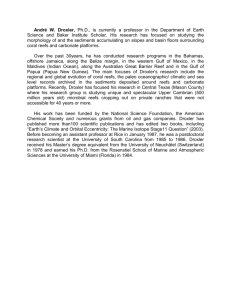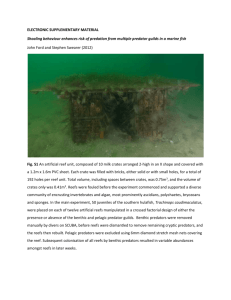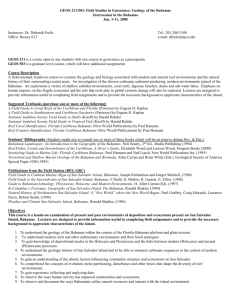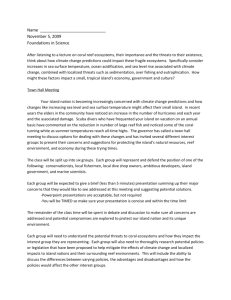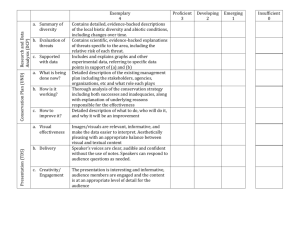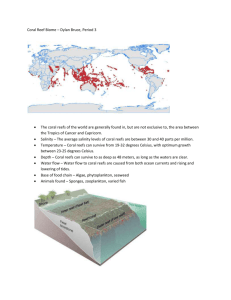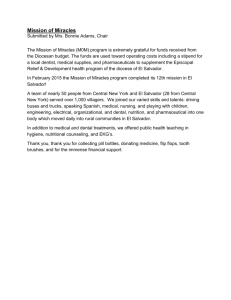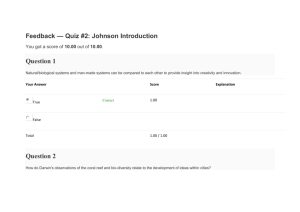University Tuition for 3 credits
advertisement
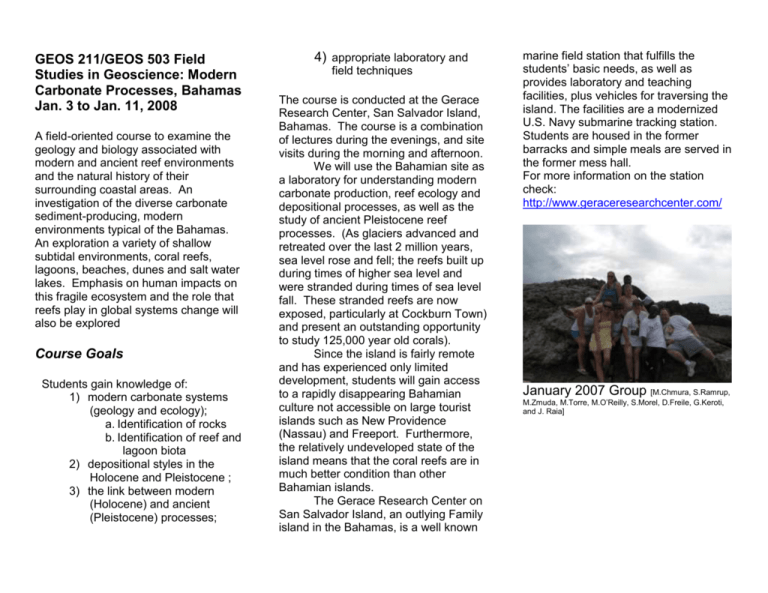
GEOS 211/GEOS 503 Field Studies in Geoscience: Modern Carbonate Processes, Bahamas Jan. 3 to Jan. 11, 2008 A field-oriented course to examine the geology and biology associated with modern and ancient reef environments and the natural history of their surrounding coastal areas. An investigation of the diverse carbonate sediment-producing, modern environments typical of the Bahamas. An exploration a variety of shallow subtidal environments, coral reefs, lagoons, beaches, dunes and salt water lakes. Emphasis on human impacts on this fragile ecosystem and the role that reefs play in global systems change will also be explored Course Goals Students gain knowledge of: 1) modern carbonate systems (geology and ecology); a. Identification of rocks b. Identification of reef and lagoon biota 2) depositional styles in the Holocene and Pleistocene ; 3) the link between modern (Holocene) and ancient (Pleistocene) processes; 4) appropriate laboratory and field techniques The course is conducted at the Gerace Research Center, San Salvador Island, Bahamas. The course is a combination of lectures during the evenings, and site visits during the morning and afternoon. We will use the Bahamian site as a laboratory for understanding modern carbonate production, reef ecology and depositional processes, as well as the study of ancient Pleistocene reef processes. (As glaciers advanced and retreated over the last 2 million years, sea level rose and fell; the reefs built up during times of higher sea level and were stranded during times of sea level fall. These stranded reefs are now exposed, particularly at Cockburn Town) and present an outstanding opportunity to study 125,000 year old corals). Since the island is fairly remote and has experienced only limited development, students will gain access to a rapidly disappearing Bahamian culture not accessible on large tourist islands such as New Providence (Nassau) and Freeport. Furthermore, the relatively undeveloped state of the island means that the coral reefs are in much better condition than other Bahamian islands. The Gerace Research Center on San Salvador Island, an outlying Family island in the Bahamas, is a well known marine field station that fulfills the students’ basic needs, as well as provides laboratory and teaching facilities, plus vehicles for traversing the island. The facilities are a modernized U.S. Navy submarine tracking station. Students are housed in the former barracks and simple meals are served in the former mess hall. For more information on the station check: http://www.geraceresearchcenter.com/ January 2007 Group [M.Chmura, S.Ramrup, M.Zmuda, M.Torre, M.O’Reilly, S.Morel, D.Freile, G.Keroti, and J. Raia] SCHEDULE OF ACTIVITIES Boat trip and snorkeling or SCUBA diving on Gaulin’s Reef and in Graham’s Harbour Comparison of beaches on the northern (Graham’s Harbour, Rice Bay) and southern points of the island (Sandy Point, Grotto Beach) Snorkeling on Dump reef and snorkeling or SCUBA diving on Telephone Pole and Snapshot Reefcomparison of the different reef environments Examination of present reefs with fossil reefs at Cockburn Town and Sue’s Point Examination of the present Pigeon Creek tidal delta and its Pleistocene analogue Exploration of the karst features of San Salvador (sinkholes, caves, banana holes) Exploration of the inland saline ponds Examination of the physical and biogenic sedimentary features of the Holocene dunes of San Salvador Examination of hydrologic features of the island (groundwater, wetlands, wells and conduits) Visit to pre-Columbian and Colonial archeological sites. Examination of environmental issues related to small tropical islands (water resources, waste disposal, overfishing…) COSTS* - University Tuition for 3 credits Check for current University rate - Transportation from NJ/NY to San Salvador, room and board while in San Salvador $ 1150.00 GEOS 211/GEOS 503 Field Studies in Geoscience: MODERN CARBONATE PROCESSES- BAHAMAS A Class and Field Course in San Salvador, Bahamas A DEPOSIT OF $400 IS DUE BY October 4, 2007 ACKNOWLEDGEMENT AND ASSUMPTION Jan. 3–Jan. 11, 2008 OF RISK form will have to be signed by all students. *Students are responsible for purchasing the following gear- mask, snorkel, fins. Students will pay for meals on the road and in the airports; Students might also want to bring spending money to cover snacks, keepsakes, etc Pre-requisite: 1 course in Geoscience (GEOS 111, 112, 115/ GEOS 603) or Consent of instructor For More Information Contact Dr. Deborah Freile Rossey 613 201.200.3188 dfreile@njcu.edu
